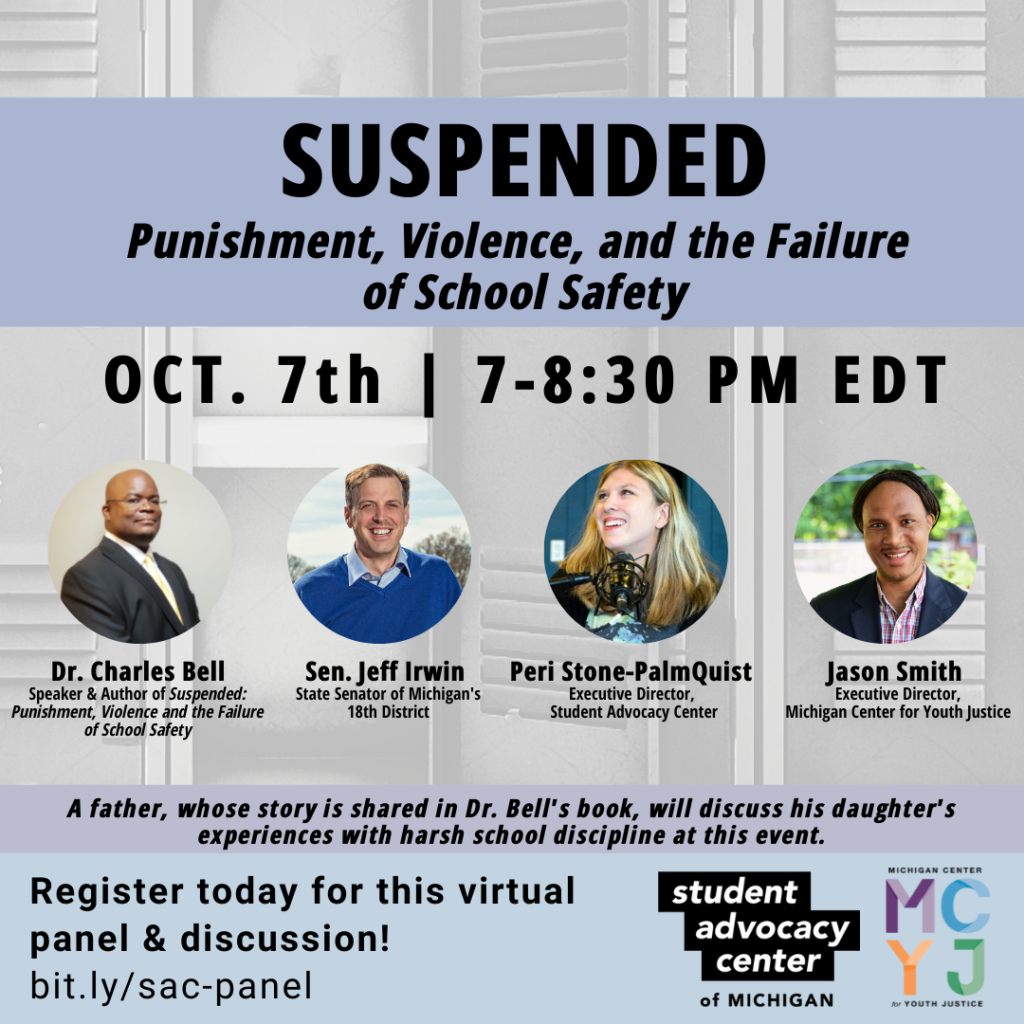
Student Advocacy Center and our families have shared about the devastating harm of suspension and expulsion for more than 30 years. But even we were gutted by Dr. Charles Bell’s groundbreaking research on Michigan’ Michigan’s overuse of suspension and the harm it causes to students, families, and communities.
Dr. Bell, a scholar originally from Detroit, recently presented key findings from his new book, Suspended: Punishment, Violence, and the Failure of School Safety, at a panel co-hosted by SAC and our partner, Michigan Center for Youth Justice. Nick, a father whose story is shared in Dr. Bell’s book, discussed his daughter’s experiences with harsh school discipline. We were joined by Senator Jeff Irwin who, along with SAC Executive Director Peri Stone-Palmquist, talked about recently introduced Expulsion Prevention Bills. The evening ended with a call to action and Q&A.
You can watch the entire Suspended: Punishment, Violence, and the Failure of School Safety Panel.
Learn more about Dr. Charles Bell’s research and book here and here.
Summary
The purpose of Dr. Bell’s research was to determine the impact of suspensions on students’ achievement, social status, relationships with educators, parents’ employment and their perceptions of school safety measures. Black students are disproportionately receiving out-of-school suspensions and expulsions. National data indicates that Black students make up 15% of the school-age population and 38% of those who received at least one out-of-school suspension. Dr. Bell’s research found that school officials were marginalizing Black students’ and parents’ voices and denying them the opportunity to be a part of the school disciplinary process.
Key Research Findings
- Bell reveals the inherent shortcomings of existing school safety measures as he describes how schools fail to protect Black students, which leaves them vulnerable to bullying and victimization. The students he interviews offer detailed insight into how the lack of protection they received in school intensified their fear of being harmed and even motivated them to use violence to establish a reputation that discouraged attacks. Collectively, their stories reveal how receiving a suspension for fighting in school earned them respect, popularity, and a reputation for toughness — transforming school punishment into a powerful status symbol that destabilizes classrooms.
- Dr. Bell’s interviews explore the frequency and severity of discipline that Black youth face, giving them a unique barrier in the pursuit of educational attainment.
- Dr. Bell discussed how harsh discipline also harmed parents’ employment, as they are called to the school repeatedly.
- Dr. Bell found that many students were being removed from school without being notified of the allegation, disciplinary recommendation, date and location of the hearing and their right to attend.
The Expulsion Prevention Legislation is a three-bill package that outlines and defines due process for students when they receive disciplinary actions that result in suspension for more than 10 days, are provided an alternative placement, or are expelled. These bills also establish an avenue for students to appeal disciplinary actions.
“I hope this book…encourages school officials to act,” Dr. Bell stated, “because this is a very serious issue and we are losing children to this. We are losing children’s lives in school and we are losing them to suicide because they are trapped in that system.”
“There are some districts that aren’t developing best practices and those best practices really need to be enshrined in law,” Senator Irwin shared. “If we raise voices across the state…we could really make a change…because there is bipartisan support for keeping kids in school, there is bipartisan support for the idea that the kids that are getting pushed out of school are the kids who we most need to work to keep in school.”
Learn more about the protections that are laid out in the Expulsion Prevention bills.
Take Action
Write a letter of support for the Expulsion Prevention legislation and request a hearing.
By Lilly Kaplan, MSW Student Intern